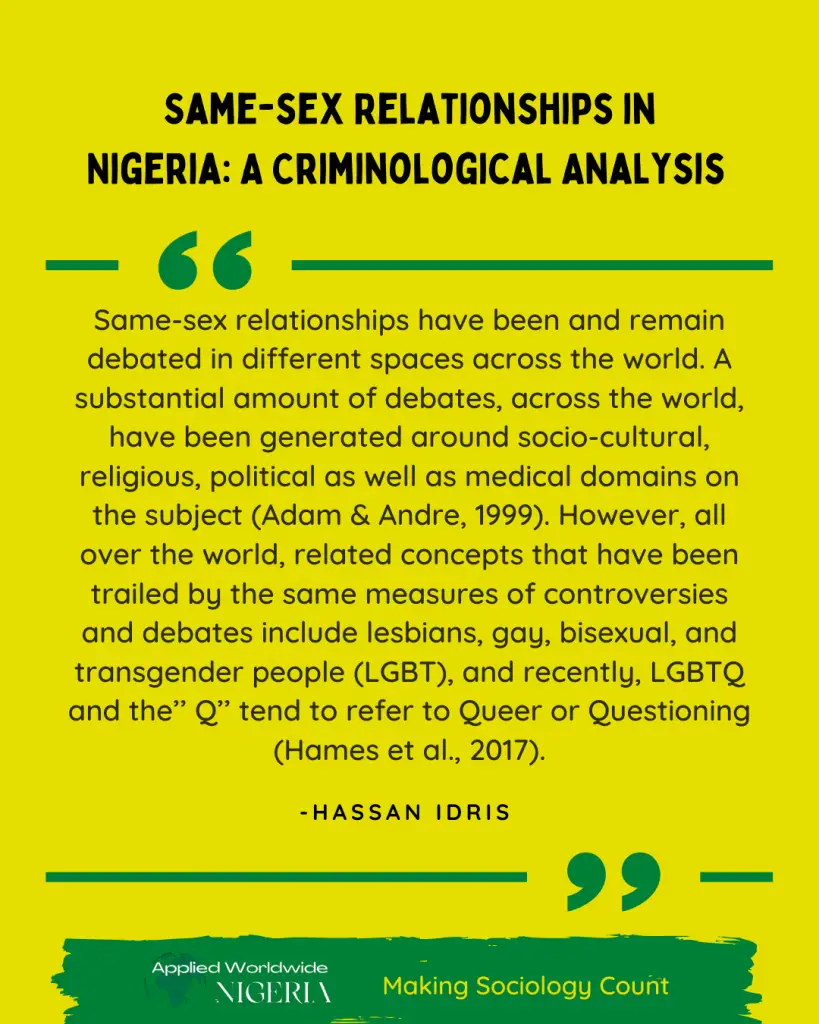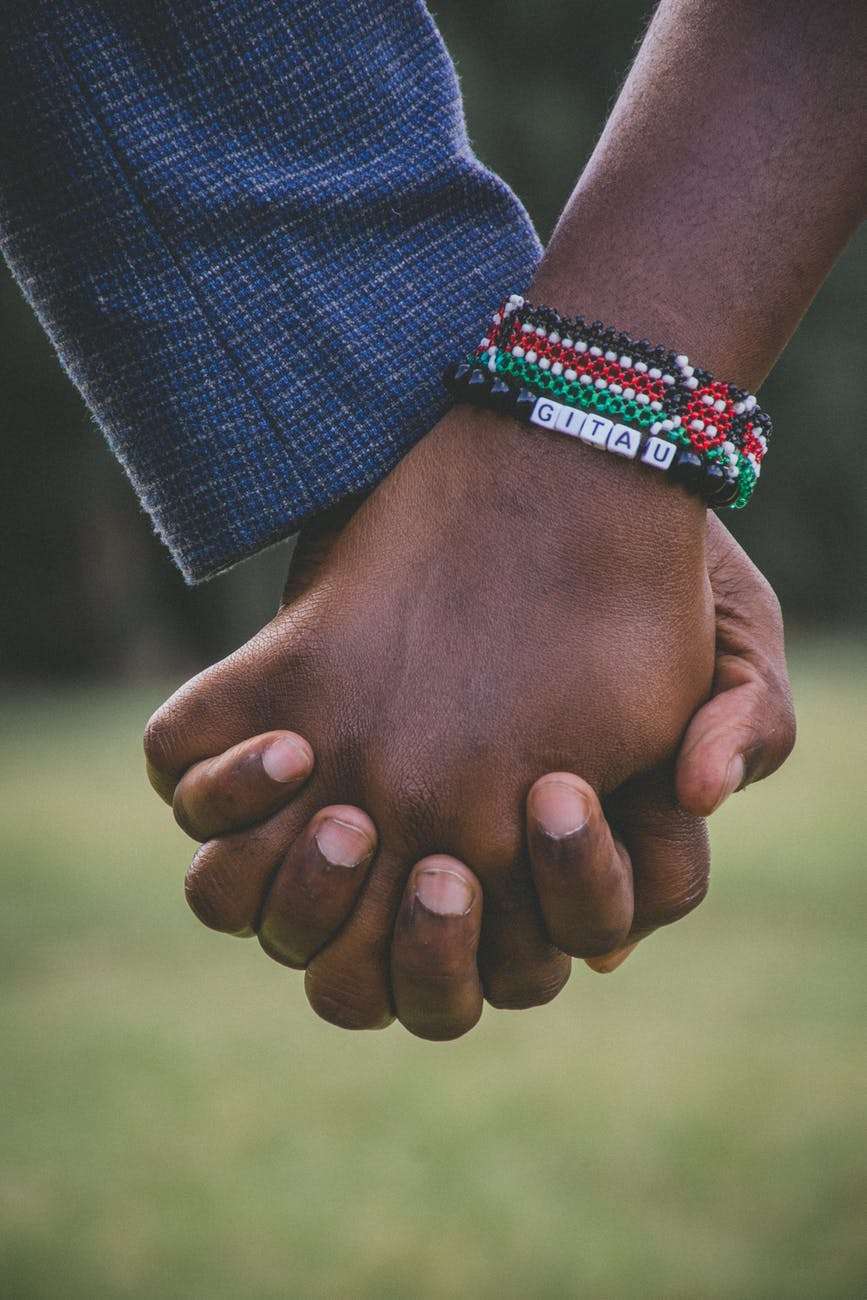
Same-sex relationships have been and remain debated in different spaces across the world. A substantial amount of debates, across the world, have been generated around socio-cultural, religious, political as well as medical domains on the subject (Adam & Andre, 1999). However, all over the world, related concepts that have been trailed by the same measures of controversies and debates include lesbians, gay, bisexual, and transgender people (LGBT), and recently, LGBTQ and the’’ Q’’ tend to refer to Queer or Questioning (Hames et al., 2017).
The controversies across disciplines are a mere reflection of the global uproars that have continued to trail various positions of nations and societies on the practice of same-sex relationships and marriages. While same-sex relationships and marriages have been legalized in some parts of the world with the rights of LGBT fully recognized, a substantial number of countries are averse to it and have promulgated laws forbidding the practice; meanwhile, a few countries remained indifferent.
Same-sex Marriage in Africa
Moving down to Africa, the majority of the countries in the continent are against same-sex relationships and marriages, out of the 54 states recognized by the united nations and African union, homosexuality is outlawed in 34 states( Reuters,2017). Nigeria is one of the African countries that prohibited same-sex relationships and marriages. On 13th January 2014, the then President of Nigeria, Goodluck Jonathan, signed into law the Same-Sex Marriage Prohibition Act, which was earlier passed by the legislative arm of government in May 2013(Amadi & Wordu,2016, Pulse 2017).
This passage of a law against homosexuality was greeted with some resistance and condemnation from some individuals, groups, and several developed countries that support LGBT rights. As a way of expressing their disagreement over Nigeria’s prohibition of the practice, some such countries considered or even implemented laws that limit or prohibit the general budget to support Nigeria and other countries that restrict the rights of LGBT people (Okanlawon, 2017).
Tolerance in Nigeria
Despite the laws prohibiting same-sex relationships and marriages in Nigeria, the practice has been reported to be growing tremendously (Okanlawon, 2017). In a 2017 survey conducted by NOI polls, a comparison of the 2015 poll of attitudes towards LGBT people in Nigeria was made and in the report, a 7 percent increase was found in acceptance of LGBT people and 9 percent rise to 39 percent of those surveyed who think that LGBT people should be allowed equal access to public services such as healthcare, education, and housing.
Similarly, the Federal Government of Nigeria in acknowledging that same-sex relationships are on the increase in the country, noted that Nigerian youths now have more tolerance for it (The Nation Online, 2016) according to the Director-General of the National Orientation Agency (NOA) “Our youths are now publicly clamoring for the legalization of gay marriage and are about to boldly take the campaign to a hollowed chambers of the National Assembly to press for it as a fundamental human right” (Pulse, 2017).
Sociology and Same-sex Marriage
A same-sex relationship is commonly and simply described as a relationship between persons of the same sex. It can take many forms, from romantic and sexual to non-romantic homo-socially close relationships (Adam, & Andre, 199). The term is primarily associated with gay and lesbian relationships; although, it’s not strictly related to the sexual orientation of the participants.
This is because people of any orientation may participate in same-sex relationships (particularly depending on the legal, social, and scientific definition of sex) (Foucault, 1986). Activists argue that referring to a same-sex relationship as a ‘’ gay relationship ‘’ or a ‘’ lesbian relationship ‘’ is a form of bisexual erasure (Garcia, 2013).
Contemporary Sociology
Contemporary studies have found that same-sex relationships can be broadly grouped into at least three categories, although there is no consensus regarding the categories, nor empirical metric which has, or could potentially be applied to strongly validate their existence (Gates, 2016). These are egalitarian, featuring two partners that are within a peer group, and adhering to the same gender role of their natural gender (irrespective of their preferred sexual role(s) (Armstrong, 2002).
However, the second category entails each partner assuming an opposite gender role. In this category, one partner is Cisgender (a term used to describe people whose gender identity matches the sex that they were assigned at birth), while the other is Androgynous (a combination of masculine and feminine characteristics) or transgender, and thus the couple superficially bear some resemblance to a heterosexual (hetero-normative) couple. The final category is age-structured, which involves partners of different ages, usually one adolescent and other adults.
According to Berkowitz and Marsiglio (2007), there’s often one form of same-sex relationship that predominates in a society, although, others are likely to co-exist. Before this, there has been a dearth of Nigerian literature and efforts by scholars on the typologies of same-sex relationships in the country. However, the egalitarian category predominates in Nigeria (Atoi & Ojedokun, 2013).
Legal Status of Same-sex Relationships in Nigeria
Moving down to the legal definition and status of same-sex relationships in Nigeria, both the Criminal Code (of Southern states) and the Penal Codes (of Northern states) forbid the practice in the country. For the Federal Criminal Code that applies to southern Nigeria, sex acts between men are illegal and carry a maximum penalty of 14 years imprisonment. However, there was no specific mention of sex acts between women in the code, although it’s arguable that the gender-neutral term “Person” in Section 214 of the code includes women.
The provision of chapter 21 of the code stipulates: “Any person who-(a) has carnal knowledge of any person against the order of nature; or…(c) permits a male person to have carnal knowledge of him or her against the order of nature; is guilty of a felony, and is liable to imprisonment for fourteen years.”
Meanwhile, Section 294 of the Penal Code (Northern States) Federal Provision Act, which applies to all states in northern Nigerian, stipulates that: “Whoever has carnal intercourse against the order of nature with any man, woman or animal shall be punished with imprisonment for a term of which may extend to fourteen years and shall also be liable to fine.”
Furthermore, Section 405 provides that a male person who dresses or is attired in the fashion of a woman in a public place or who practices sodomy as a means of livelihood or as a profession is a “vagabond.” Under Section 407, the punishment is a maximum of one-year imprisonment or a fine, or both. Section 405 also provides that an “incorrigible vagabond” is “any person who after being convicted as a vagabond commits any of the offenses which will render him liable to be convicted as such again.” The punishment under Section 408 is a maximum of two years imprisonment or a fine, or both.
Prohibition of Same-sex Relationships
In furtherance of the prohibition of a same-sex relationship, the Same Sex-Marriage (Prohibition) Act (SSMPA) of 2014 was equally enacted by the National Assembly and passed into law in Nigeria. This law bans gay marriage, same-sex “amorous relationships,” and membership in gay rights groups with penalties of up to 14 years in prison.
Sections in the Act also include the prohibition of the solemnization of same-sex marriage in places of worship (only a marriage contracted between a man and woman shall be recognized as valid in Nigeria) and the prohibition of the registration of gay clubs, societies, and organizations, their sustenance, procession, and meetings.
Criminology and Same-sex Relationships in Nigeria
Moving down to the criminological aspect, as a crime in Nigeria, the practice of same-sex relationships has not abated in the country and the impact of the Same-Sex Marriage (Prohibition) Act and other legal statuses against same-sex relationships have been reported below.
Civil and human rights bodies have pointed out that the SSMPA, in many ways, officially authorizes abuses against LGBT people, effectively making a bad situation worse (Amnesty International, 2013; Human Rights Watch, 2016). The passage of SSMPA was immediately followed by extensive media reports of high levels of violence, including mob attacks and extortion against LGBT people (Pulse, 2017).
Concluding Thoughts on Same-sex Relationships
In conclusion, some analysts in their reports have equally pointed out that the law is poorly implemented as same-sex relationships still pervade in major cities in the country (Amadi & Wordu, 2016). Some studies and newspaper reports have indicated the rise in same-sex practices across the country (Ikediashi, & Akande, 2015; The Nation Online, 2016; Pulse, 2017).
Notable public figures in the country dress and express behavioral traits of being gay or lesbians without any form of reprimand. According to newspaper reports, some LGBT celebrities even take to social media to announce their orientations and exploits in same-sex relationships without any implications (Amadi & Wordu, 2016; Pulse, 2017).





